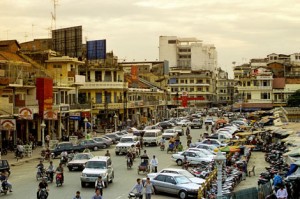 I once read that there are but three types of western expats to be found in Cambodia: drunken/stoned womanizers, fugitives, and do-gooders. After much independent research and a brief stopover during a border run from Thailand, I have no reason to question the veracity of this assertion. That said, I will leave the former two to others and focus this brief posting exclusively on the latter.
I once read that there are but three types of western expats to be found in Cambodia: drunken/stoned womanizers, fugitives, and do-gooders. After much independent research and a brief stopover during a border run from Thailand, I have no reason to question the veracity of this assertion. That said, I will leave the former two to others and focus this brief posting exclusively on the latter.
As a past volunteer with an NGO based in Southeast Asia, I am fully aware of the ambivalence associated with civil societal organizations. However, after reading Ken Silverstein’s excellent piece over at Slate recently, I admit this issue is exceptionally problematic for NGO staffers with even the most benevolent of intentions.
The problem, of course, is rooted in greed, an issue which transcends national borders and language barriers of all kinds. There are myriad NGOs which promote very worthy causes in the developing world, such as gender equality, poverty reduction, and securing access for the most at risk segment of the populous to fundamental human rights. But if there was not a profit to be made – for both individuals and organizations – what incentive is there to devote time and resources to such causes?
This dichotomy between the affinities to help those less fortunate and profiting from such endeavors was cogently manifested in the recent controversy surrounding Muhammad Yunus and the microfinance debate. I recently wrote about the pros and cons of microfinance for Foreign Policy Blogs, and it is an issue which has certainly garnered attention since Yunus’ termination at Grameen Bank, an institution which Yunus himself founded.
Helping versus profiting is also apparent on environmental issues. It has been argued that one of the reasons why green technology and alternative energy sources have hitherto failed to usurp oil is simply because it is not profitable yet. Clearly, the status quo of the world’s oil consumption vis-à-vis its consumption of solar, wind, or even nuclear is unsustainable. One day, the world will have to get off oil. But until the green revolution becomes profitable, that day is not likely to be sooner rather than later.
It begs the question: would a country like Cambodia be better off without the influx of western institutions? I can see both sides but ultimately I would argue that the country is better served with NGOs operating there, as opposed to without, despite the deficiencies of their altruistic objectives. One needs only to look at Myanmar to find an appropriate juxtaposition. The military junta there prohibits any type of outside influence; they even initially barred relief agencies from distributing humanitarian aid after the deadly Cyclone Nargis killed over 130,000 people in 2008, before eventually capitulating to augmenting international condemnation. It really is a shame that so many people have sought to profit from Cambodia’s tragic past under the guise of munificence, and I certainly would not argue that NGOs operating there are a necessity. But the reality is there are many Khmer’s who have benefited in some way from these agencies which, in my opinion, makes the shortcomings of NGOs a little more tolerable.